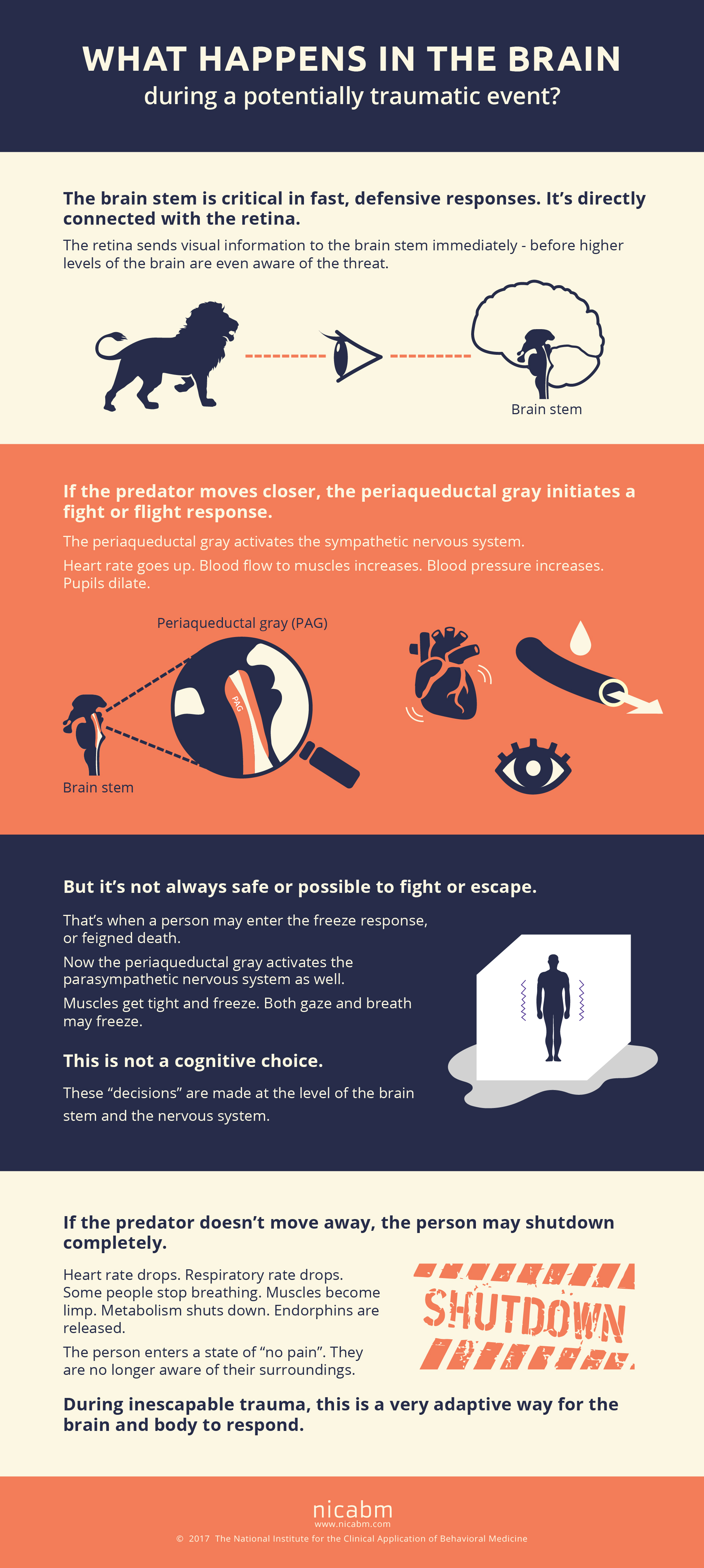After trauma, our clients are often left with many painful sensations and emotions . . .
. . . including shame and guilt.
And that’s especially true if they weren’t able to protect themselves or escape.
That’s why it can be so useful to help our clients understand how their brain and body did work to protect them during the traumatic event.
Because when people find out that their response was an adaptive reaction that helped them survive, that can open the door to healing.
So we thought it would be helpful for you to have a way to illustrate this for your clients. (Please feel free to share a copy with them.)
Click the image to enlarge
If you’d like to print a copy to share with your clients, just click here: Color or Print-friendly
(Please be sure to include the copyright information. We put a lot of work into creating these resources for you. Thanks!)
If you’re interested in more ways to work with the brain’s response to trauma, you can get some of the top strategies in our Advanced Master Program on the Treatment of Trauma.
In this program, you’ll hear more from Stephen Porges, PhD, along with Bessel van der Kolk, MD; Pat Ogden, PhD; Peter Levine, PhD, Thema Bryant-Davis, PhD, and other leading experts in the field. Just click here.
Now we’d like to hear from you. How will you use this in your work with clients? Please leave a comment below.

While many of the names here are landmarks in trauma therapy, I’m confused by your inclusion of Steven Porges.
Polyvagal theory has two marks against it.
1. Near as I can tell, there is zero supporting science behind it.
2. The diagrams associated with PVT imply that a person cannot transition from a normal state to a hypo-arousal state without transistioning through hyperarousal. This is not borne out by either my experience nor numerous other people.
As happens a lot in psychology, models are often much too simple to cover the actual observed behaviour. Basing treatment on a bad model either won’t work or possibly make the patient worse.
In the window of tolerance metaphor, I spend decades of my life in the lower reaches, in a mix of very low arousal, dipping into freeze responses, and reaction depression; and what Pete Walker refers to as “Left Brain Dissociation” — getting wrapped up in intellectual activities as a way of suppressing emotions. This was spiced with short high arousal moments of either anger or focused action when lives were at stake.
So, yes. I can move from normal activation to freezing, to high activation, short of manic, back to normal, and never experience true hyperarousal. I have heard accounts of hyperarousal in others, where the person claimed to to have been there, but witnesses disagree.
As to how hypo? On several occasions, I was pretty sure I was going to die, vision tunneling down, even while lying down, pulse rate in the low 20’s, no fear of death, just acceptance, and mild regrets for things left undone. Then made the transition back to normal activation.
freeze is the last of all threat responses, meaning hormonally we move through excitable emotions before moving into immobilizing hormones. Anecdotally, I freeze when overwhelmed and feeling powerless, and if anything motivates me towards anger I will jump out of freeze immediately. Getting angry is the only way to mobilize me quickly. Otherwise I must start moving slowly or I will get easily overwhelmed and collapse back into freeze.
Freeze is not last, but generally not first.
Fight or flight for many is a first response.
But sometimes you recognize that this isn’t the right one. (I am convinced that while the midbrain can trigger a response, this can be countermanded cognitively in the presence of training. I have experienced this in first aid situations (Ski Patrol) and in wilderness expeditions. (Lives depended on my choices when dumped myself and 6 kids in a freezing rapid)
One of my usual responses to a moderate stress situation — a party — is to go silent, move to the edge of the room and watch and wait. Sometimes I can dissociate, become dual aware and a part can engage in social chit chat with others, with primary self is watching and waiting.
The watch and wait to me is an evolutionary response. Freezing into immobility or near immobility can help escape notice of predators, where getting all excited and running engages the predators prey drive.
“Here there be tigers” calls for waiting for the tiger to leave or move off enough so that you can run to the tree.
Thank you NICABM for yet another infographic.
I appreciate the variety of Courses and Teaching Aids that are being offered by your organization and highly-qualified Professionals.
This Graphic in particular, helped in the visualization and understanding of how the brain and body may respond when faced with trauma. Notably, that under continued threat… the freeze response may progress to complete shutdown of the body and it’s systems.
Very helpful!
People suffering from the effects of dissociation constantly doubt the validity of their memories. It may be helpful that the very fact that they suffer from an over-sensitive freeze response can point to the validity of their experience. Information about the severity of experience that causes this response, and the connection with its manifestation in therapy on triggering those memories, can be validating, to a mind that has been taught to doubt its own experience. Here is objective proof.